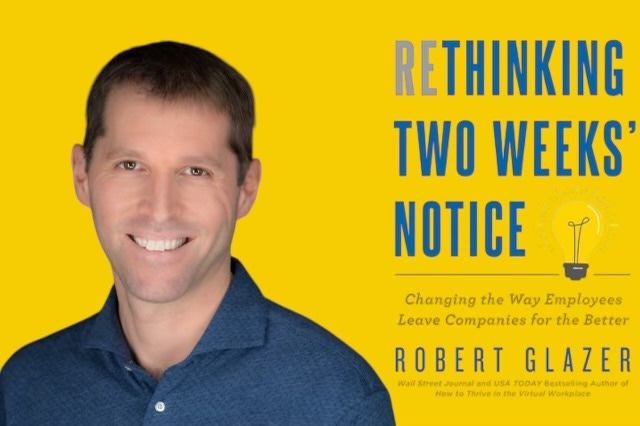Employee Transitions and ‘Two Week Notice’
Noted Author Robert Glazer’s Alternative Prescription
In a world of workplace relationships, endings often mirror messy breakups — abrupt, strained and littered with missed opportunities for mutual growth.
In his groundbreaking book, Rethinking Two Weeks’ Notice: Changing the Way Employees Leave Companies for the Better, Robert Glazer unveils a transformative framework to overhaul the archaic two weeks’ notice system.
It is here where he introduces the concept of the Open Transition Program (OTP), a strategy designed to foster psychological safety, honest communication, mutual respect and shared benefit for both employees and employers.
This vision for rethinking transitions aligns seamlessly with the mission of the Dave Alexander Center for Social Capital, whose commitment to people-centric business strategies echoes Robert’s call for a paradigm shift.
By prioritizing social capital — the trust, respect and goodwill between individuals and organizations — both the book and the Center advocate for a world where business success and human flourishing are not mutually exclusive but mutually reinforcing.
The Problem with the Status Quo
For decades, the two weeks’ notice system has remained a cultural default, rooted less in respect and more in a collective inertia. As Robert aptly observes, this norm often leaves both parties — employers and employees — scrambling.
Employees keep their plans hidden, fearing retaliation, while companies react defensively, blindsided by sudden departures. In a worst-case scenario, relationships built on years of trust crumble under the strain of rushed exits, tarnishing what could have been amicable partings.
This system, Robert argues, reflects a broader failure of communication and trust in workplaces. Employers often cultivate environments where honesty about dissatisfaction is met with hostility rather than openness.
Employees, in turn, learn to suppress their concerns until they can exit on their own terms. The result? A toxic cycle of distrust, poor transitions and missed opportunities for growth.
Says Robert in an article he wrote entitled “Saying ‘Buh-bye’ to Two Weeks’ Notice: Rethinking the Dreaded Employee Exit”:
“If you’re an employee, you may wonder what’s wrong with giving two weeks’ notice, especially if you have never managed a team of people. While two weeks’ notice has become an accepted default, it’s not even a requirement. In the United States, unless you are under contract, you are employed at will, and you can leave a company without any notice.”
He adds that two weeks’ notice “is a cultural norm rather than a legal one that for decades has generally been considered a courteous way to leave a job.”
The Open Transition Program: A New Way Forward
Robert’s Open Transition Program (OTP) is an antidote to this dysfunction. Built on four core principles — psychological safety, open communication, mutual respect and shared benefit — the OTP creates a culture where both parties can address dissatisfaction openly and collaboratively.
Instead of abrupt departures or reactive terminations, transitions become intentional, transparent and mutually beneficial.
For instance, Robert shares the story of “Jim,” an employee whose declining performance signaled disengagement. Rather than terminate Jim abruptly or subject him to another ineffective performance plan, his employer initiated a candid conversation.
They discovered that Jim was ready to pursue new opportunities. By allowing him to stay on while searching for a better fit, the company ensured a smoother transition for both parties, preserving relationships and operational continuity.
The success of this approach lies in its acknowledgment of a simple truth: Employment is no longer a lifetime commitment. By embracing this reality, organizations can foster goodwill and trust, ensuring that departures are not only less disruptive but also leave the door open for future collaborations.
The Dave Alexander Center for Social Capital: A Natural Ally
The tenets championed in Robert’s book finds a powerful ally in the mission of the Dave Alexander Center for Social Capital. The Center’s work is rooted in the belief that businesses thrive when they prioritize people. Social capital — the trust, relationships and shared values that bind organizations together — is positioned as the ultimate asset for 21st-century success.
By chronicling and amplifying the stories of CEOs and organizations that lead with purpose, the Center underscores the importance of mutual respect and collaboration in building thriving workplaces.
Robert’s OTP, with its emphasis on creating psychologically safe environments and fostering open dialogue, embodies these values in action. Both the book and the Center advocate for a business culture where people are seen not as expendable resources but as the heart of success.
In an article written by Robert entitled “Why Progressive Employers Are Not Letting the Door Slam on Employees’ Way Out,” he adds:
“Today’s employers and employees tend to form more of a short-term alliance than a lifetime partnership. Most companies, however, haven’t really evolved many of their practices in response to this shift; they keep the same norms that were designed when departures were less frequent, even as those exits have become routine. This is where an OTP comes into play: Once you accept that employees leaving is an inevitability of modern business — no matter how great your culture is — you’ll want to make them as productive as possible.”
The Business Case for Kindness
Some skeptics might view the OTP as a soft or impractical solution, but Robert and the Center make a compelling case that prioritizing people is good for the bottom line. Transparent transitions reduce the costs of turnover, prevent the ripple effects of distrust and enhance a company’s reputation as an employer of choice.
Take Netflix, for example, whose approach to employee departures — generous severance packages paired with open communication — has become a model of respectful transitions.
While not every company has Netflix’s financial resources, Robert highlights how even small and medium-sized businesses can adopt similar principles. The result is a workplace culture that attracts top talent, fosters loyalty and enhances long-term success.
Toward a New Employment Paradigm
At its core, Rethinking Two Weeks’ Notice challenges us to reconsider what it means to lead with integrity in a rapidly changing professional landscape. Robert’s OTP offers a roadmap for creating workplaces that are both humane and efficient, where endings are not viewed as failures but as opportunities for growth and collaboration.
The Dave Alexander Center for Social Capital shares this vision, championing leaders who see people as the point of business. Both the book and the Center call for a reimagining of capitalism — one that values human connections as much as profit margins.
Final Thoughts
The two weeks’ notice paradigm has overstayed its welcome, perpetuating distrust and inefficiency in a world that demands greater collaboration. Robert’s Rethinking Two Weeks’ Notice provides a bold and actionable alternative, inviting organizations to embrace open transitions as a path to stronger relationships and greater success.
As the Dave Alexander Center for Social Capital reminds us, social capital is the ultimate currency of the future. By fostering trust, respect and honest communication, businesses are able to not only navigate transitions more effectively but also redefine what it means to lead with purpose in an increasingly complex world.









